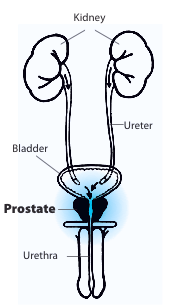 The prostate is a walnut-sized gland that forms part of the male reproductive system. The prostate is located just below the bladder, where urine is stored. The prostate also surrounds the urethra, the canal through which urine passes out of the body. It is common for the prostate gland to become enlarged as a man ages. Benign Prostatic Hyperplasia (BPH) is non-cancerous enlargement of the prostate gland. It affects more than 50% of the men over age 60. Testosterone and other hormones may play a role.
The prostate is a walnut-sized gland that forms part of the male reproductive system. The prostate is located just below the bladder, where urine is stored. The prostate also surrounds the urethra, the canal through which urine passes out of the body. It is common for the prostate gland to become enlarged as a man ages. Benign Prostatic Hyperplasia (BPH) is non-cancerous enlargement of the prostate gland. It affects more than 50% of the men over age 60. Testosterone and other hormones may play a role.
Common symptoms of BPH:
- Weak urinary stream
- Urgency to urinate
- Leaking or dribbling of urine
- More frequent urination, especially at night
How is BPH diagnosed?
Often it is the symptoms that lend to the diagnosis of BPH. A routine check up that includes a digital rectal examination may reveal BPH. To rule our cancer, a prostate specific antigen (PSA) blood test might be done. Other tests include urine flow study, rectal ultrasound, cystoscopy and/or biopsy.
Are lifestyle modifications effective?
Decreasing fluid intake before bedtime, moderate alcohol consumption, reducing caffeine intake, and timed toileting may help. Do not urinate in a rush; try to relax while using the bathroom. Avoid medications with anti-cholinergic effects such a Benadryl that can make symptoms worse.
What herbal remedies are available?
The best-studied herbal remedy is Saw Palmetto, which is an extract of the fruit of Serenoa repens. Also, Serenoa repens may provide mild to moderate improvement in urinary symptoms and flow measures. Beta-sitosterol is another herbal remedy that may be effective.
What is the treatment for BPH?
BPH cannot be cured. The focus of treatment is on improving the symptoms. Many medications are available such as Flomax, Uroxatral, Hytrin or Cardura. Common side effects are lightheadedness and headaches. Proscar and Avodart belong to another class of medications that gradually reduce the size of the prostate gland over months.
When is surgery indicated?
If symptoms are bothersome and affect a person’s quality of life, then a surgery called Transurethral Resection of the Prostate (TURP) is indicated. Other alternatives include laser and Transurethral Microwave Therapy (TUMT), which are less invasive and may be performed in the physician’s office.
Send in your requests of medical topics for Dr. Ritabelle to write about in future issues to Percy Ihara.

